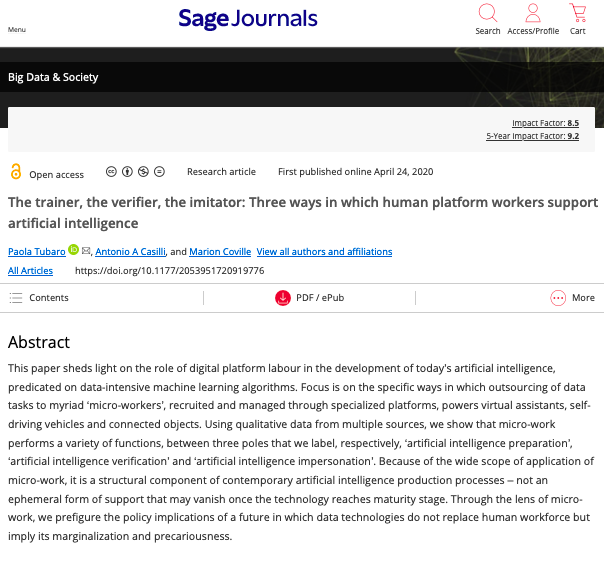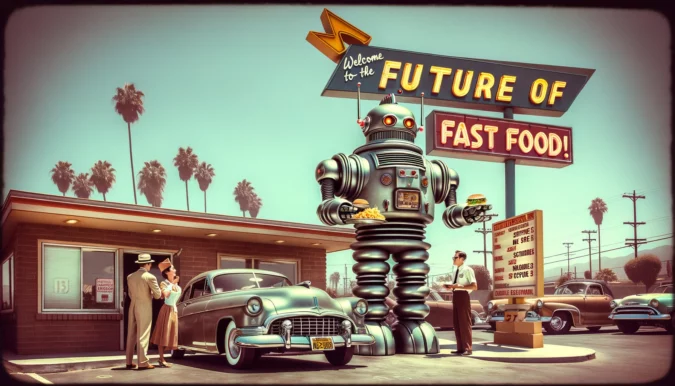The narrative of automation is a capitalist scare tactic. Threatening to displace workers en masse, conceals the underlying reality: AI depends on human labor. Far from rendering human workers obsolete, today’s artificial intelligence points toward a future where workers are not replaced by robots but by other, less-paid workers, often at the expense of job security and worker rights. This calls for a reevaluation of our approach to technology, labor, and the ethical implications of AI in the workplace.
Deterring workers through artificial intelligence
The specter of automation looms large, invariably portrayed as a harbinger of a jobless future where machines displace human labor. However, a deeper dive into the mechanics of automation reveals a reality far more nuanced and, in some instances, starkly at odds with the capitalist dream of a fully automated workforce.
A case in point is the situation of California’s fast food workers, who have long been engaged in a battle for fair wages. As they pushed for economic justice, fast food chains wielded the threat of replacement by artificial intelligence as a deterrent. But to what extent robot drive-thrus that interpret customers orders and prepare their food are actual technological advances? To what extent they are just a façade devised to keep unions and workers in check? As uncovered by online media The Verge, what was touted as AI automation by companies like Presto Automation (a subcontractor of major US fast food chains) turned out to rely heavily on outsourced human labor from Asia, with over 70% of orders being completed by off-site workers.
“There’s a pattern of AI “solutions” that actually end up being contractors working in countries with lower labor costs — and often, the AI companies work hard to conceal this fact.”
The Verge
Does AI create more jobs than it displaces?
This revelation shouldn’t come as a shock. The dynamic of AI creating more jobs than it displaces is not new. For each job supposedly made redundant by AI, three more emerge: one to prepare the data and algorithms, another to verify the AI’s functionality, and a third to impersonate the AI when it fails. Our open access article The trainer, the verifier, the imitator: Three ways in which human platform workers support artificial intelligence was published in the journal Big Data & Society, was co-authored by DiPLab’s Paola Tubaro, Marion Coville, and Yours Truly. In this article we highlight the critical role of human labor in the development of today’s AI.

This labor, often outsourced to vast networks of “micro-workers,” is essential in powering everything from virtual assistants to autonomous vehicles, underscoring the fallacy of an imminent AI-driven workerless future. This cycle of dependency on human labor underlines the fact that the current evolution of artificial intelligence, especially in digital platform labor, is not leading towards the obsolescence of human work but rather its marginalization and precariousness.
It only works if you order more than you can eat
Further complicating the narrative is the functionality of AI in fast food ordering systems. Presto Automation’s AI, for instance, is primarily calibrated to upsell, pushing customers towards larger sizes or more expensive items. This upselling mechanism, while boosting profits for fast food chains, has detrimental implications for public health, exacerbating the issues stemming from fast food consumption.
Former CEO of tech company Presto explains what AI-driven productivity increases mean: upselling! 80-95% more often than human workers. Extra fries and giant desserts. Fast food chains make more money, but Americans’ health is getting worse from fast food.
Hear @mosherd talk about how upsell tends to be one of the biggest drivers of value for AI in the drive-thru at the Restaurant Leadership Conference @presto_ai $PRST pic.twitter.com/mlf3rXNWnp
— Krishna K. Gupta (@KrishnaKGupta) April 19, 2023
This is one of the reasons why up to 70% of automated fast food orders fail. Robot drive-thrus are calibrated to take the sale to the next level, i.e. to convince customers to buy bigger milkshake or a more expensive burger. If the customers do not comply, the machine ceases to function.
So uhh we broke the Checkers AI drive thru 💀 pic.twitter.com/SJzm89B4rW
— Kyle ✌🏻❤️ (@kylecoolky) November 15, 2023
Other Presto guys say AI helps upsell, but it’s pointless when it comes to high-stakes questions like allergens. The reliance on AI for critical functions like allergy inquiries reveals a glaring oversight in the automation agenda. The claims of minimal human intervention stand contradicted by the reality, as companies like Presto have had to step in for the majority of orders, underscoring the limitations and challenges of current AI technologies. NB: In this last video, Presto officers blatantly lie about “not having to intervene in 70% of orders”. That’s exactly how often they had to intervene, as per The Verge.
The AI will take your order now.@caelynpender headed to one of the 300 fast-food joints across the US whose drive-thru is staffed by an AI chatbot. More: https://t.co/nXJeACEQ3X pic.twitter.com/8faWRbOlUz
— Bloomberg Originals (@bbgoriginals) July 10, 2023
